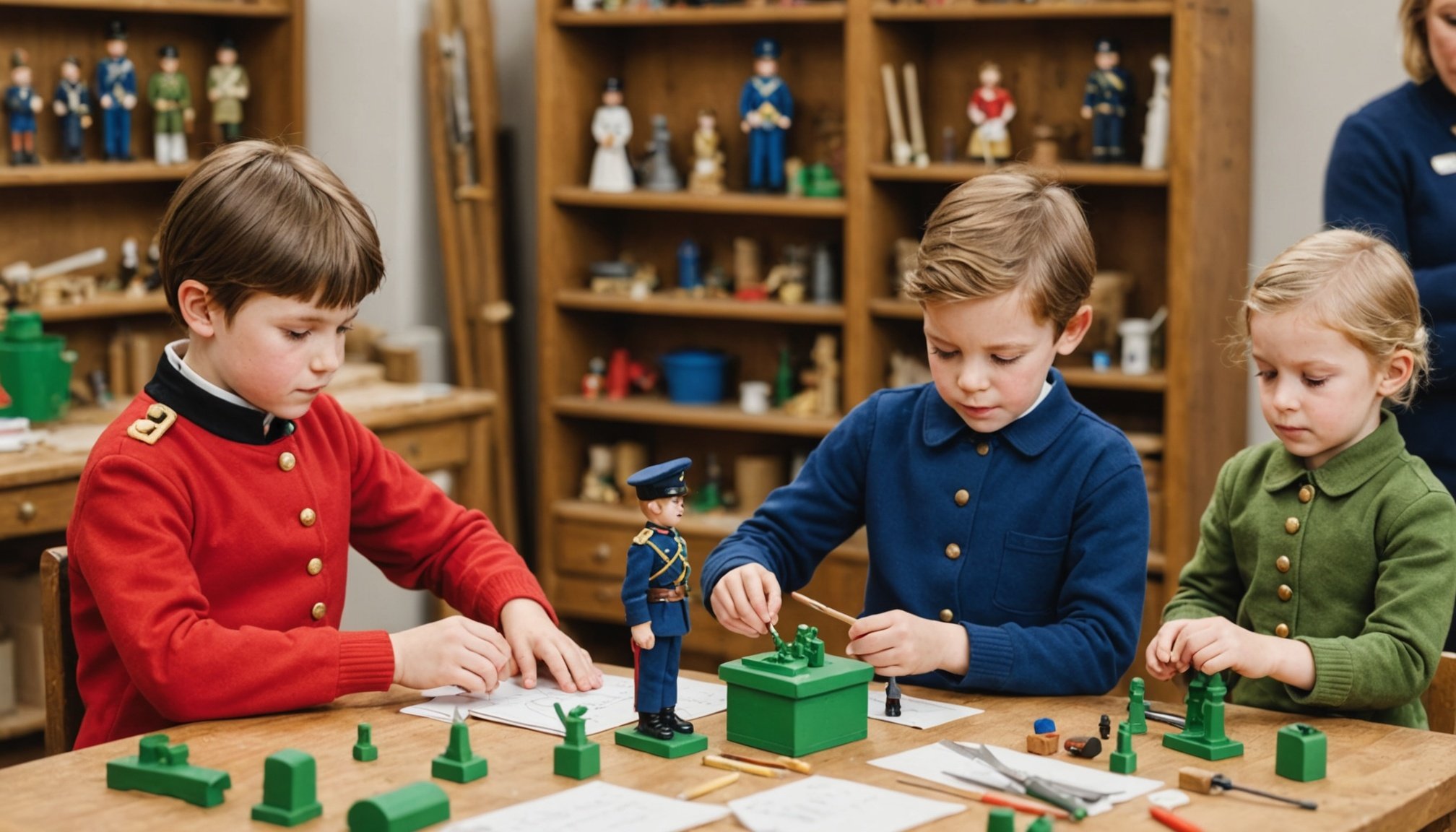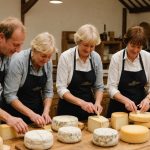Overview of Classic British Toy Soldier Crafting
Classic British toy soldier crafting boasts a rich tapestry woven through history, capturing the imagination of enthusiasts and collectors. These miniature figures are not only charming pastimes but also serve as historical storytellers, deeply embedded in the history of toy soldiers in the UK. Their cultural relevance is indisputable, with each figure often reflecting social paradigms and military fashions of its era.
The crafting process is where tradition meets artistry. It starts with designing the soldier, paying attention to historical accuracy. Beginners entering this field will find it a meticulous but rewarding hobby that involves several stages. Casting is often done using lead or tin, creating sturdy yet intricate figures. Following this, a delicate filing and smoothing process ensures each piece is devoid of imperfections.
Have you seen this : Everything you should prepare for stray kids london tour 2025
Artistic techniques are crucial for bringing these figures to life. Painstaking attention is paid to details, with vibrant paints layering the uniforms and accents. Techniques such as washes and dry brushing are employed to add depth and realism, enhancing the intricate designs.
When delving into this craft, choosing the right materials, like enamel or acrylic paints, and investing time in exploring historical references will ensure the process is both educational and fulfilling.
Also to discover : Discover the UK Cities with the Most In-Depth Tours Exploring British Housing Policy History
Popular Workshop Locations Across the UK
Exploring the UK workshops scene, particularly for toy soldier crafting, can offer a delightful hands-on experience. Discovering tools, techniques, and artistic flair across regions, these venues invite enthusiasts of all levels.
Northern England
In Northern England, toy soldier crafting thrives in community-focused venues. The Model Room in Manchester, known for its inclusive environment, welcomes beginners and seasoned creators alike. Here, participants can access a variety of materials and professional guidance. In Newcastle, Hobby Junction offers workshops with a unique twist—night events coupled with social gatherings to foster camaraderie.
Central England
Central England boasts several distinct toy soldier crafting venues. Birmingham’s Craftsmen Guild is celebrated for its hands-on experience approach, emphasising traditional crafting techniques with modern twists. Meanwhile, Nottingham’s Miniature World specializes in detailed painting sessions, enabling attendees to enhance their artful precision.
Southern England
Down in the southern part of the UK, the crafting scene is vibrant. Craft Haven in Brighton offers weekend sessions that blend crafting with history, often focusing on historical army figures. Similarly, London’s Model Masters provides an interactive environment in their workshops, ideal for both kids and adults, with a spotlight on innovate assembly methods.
Workshop Schedules and Pricing
Discover the world of toy soldier workshops with a flexible schedule designed to fit varied lifestyles. These enriching classes typically last between 1 to 3 hours per session, providing ample time for creativity and learning. Most workshops occur weekly or bi-weekly, making it convenient for participants to commit to a schedule that suits them.
The pricing for these workshops varies to accommodate different skill levels and time commitments. Beginners might find classes ranging between £15-£25 per session, a reasonable entry point into the hobby. For those pursuing more advanced techniques, prices increase to £40-£60 per session, reflecting the specialized instruction provided.
For budget-conscious enthusiasts, there are enticing options available. Many workshops offer discounts for group bookings; perfect for friends or family wishing to learn together. Additionally, registering early can often secure a reduced rate, rewarding those who plan ahead.
Explore these workshops not only for their enriching content but also for the attractive pricing models. By selecting the right class duration and pricing option, you’ll ensure an engaging and worthwhile experience in the art of crafting toy soldiers. Enjoy a fulfilling hobby while keeping both time and cost in check.
Participant Experience and Reviews
Understanding the participant experience in hands-on crafting workshops is essential. Feedback gathered from attendees often reveals the key elements that made these workshops successful. Common themes in workshop reviews highlight the joy and satisfaction participants derive from these sessions. Many describe them as fulfilling and engaging, where they can freely explore their creativity.
Attendees frequently express their appreciation for the interactive nature of these workshops. One participant shared, “The hands-on crafting experience was unlike any other. It allowed me to not only learn but to truly immerse myself in the craft.” Such testimonials underscore the importance of an engaging, practical approach to learning.
Moreover, participant feedback highlights the supportive atmosphere fostered by the workshops. Participants appreciate the opportunity to collaborate and connect with others who share similar interests. Another former participant stated, “The community aspect really enhanced my crafting journey. I left with not only skills but also with friendships.”
In summary, workshop reviews illustrate that these crafting experiences are more than just educational. They offer an enriching experience that combines learning with personal growth and community building. Through such testimonials, the unique value of these workshops becomes evident, inspiring others to embark on their own creative journeys.
Tips for Beginners in Toy Soldier Crafting
Starting off in the world of toy soldier crafting can seem daunting, but with the right beginner crafting tips, anyone can master it. Fundamental to success in this hobby are the essential tools and materials. As a beginner, ensure you have:
- A sharp knife or blade for precise cutting
- Acrylic paints in a variety of shades
- Fine detail brushes
- A cutting mat
- A magnifier for intricate details
Understanding the toy soldier crafting basics can help avoid common challenges. Beginners often struggle with over-painting, which can obscure details. To combat this, apply thin layers of paint and allow each to dry fully before adding more.
Pitfalls may also arise in assembly—ensure parts fit correctly before applying glue, and use clamps or rubber bands to hold pieces firmly as they set. Patience is key.
To advance your skills, explore various crafting tools such as airbrushes for smoother finishes or specialized tools for texturing. For growth, tap into online forums, crafting books, or local workshops. These resources offer invaluable insights and foster a sense of community, empowering you to continuously refine your craft. Keep experimenting and exploring, as the possibilities in toy soldier crafting are endless!
Expert Profiles and Instructors
Discover the people behind the magic of crafting through their detailed expert profiles. These expert crafters are not just skilled artisans but also dedicated workshop instructors who hold a wealth of knowledge and experience. Each instructor brings their unique crafting expertise to create an enriching educational experience.
Take, for instance, Jane Doe, a seasoned textile artist with over 20 years in the industry. Her philosophy revolves around sustainability, crafting bespoke items from recycled materials. She believes that every piece tells a story and encourages her students to find their narrative in every stitch.
Another example is John Smith, renowned for his exceptional woodcarving. His workshops focus on traditional techniques, balancing historical craftsmanship with contemporary design. John’s notable achievements include being featured in multiple international exhibitions and contributing to respected woodworking publications.
These instructors are more than just teachers; they are innovators, continually pushing the boundaries of their respective crafts. They not only share skills but foster a creative environment where every participant is encouraged to explore their imaginative potential. Engaging with such passionate experts can offer unparalleled inspiration, helping attendees to refine their techniques and cultivate their own crafting philosophies.
In short, learning from these professionals connects students to a broader crafting community, enriching their creative journey.










